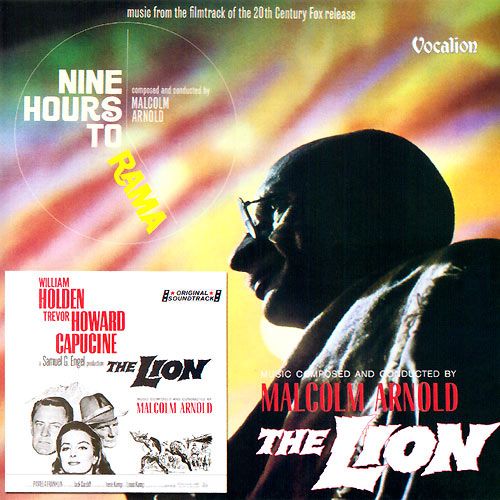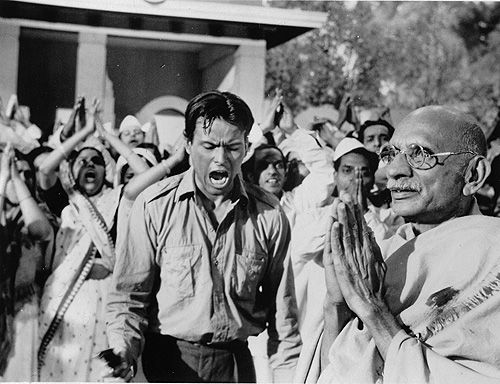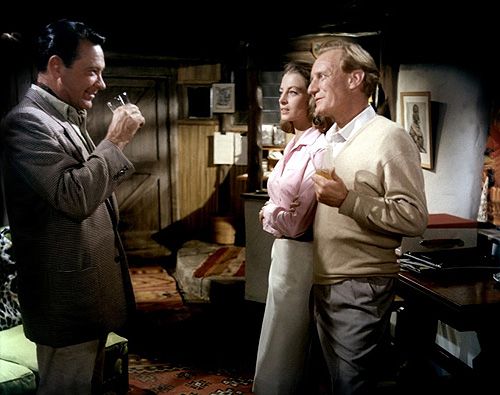wimpel69
05-17-2013, 03:54 PM
The link for the FLAC version has been re-upped now, incl. artwork.
Please add to my reputation(!) if you download my material.
Sir Malcolm Arnold's 60-year career has shown him to be perhaps the most versatile
and prolific of the many British composers who emerged in the post-World War II era. Born in
Northampton in 1921, Arnold was trained as a composer and trumpeter at the Royal College of
Music from 1938 to 1941 (under Gordon Jacob for composition and Ernest Hall for trumpet), after
which he won a trumpet position with the London Philharmonic Orchestra. After a promotion to
principal trumpet in 1942, Arnold's career there was interrupted by two years of military service
(1944-1945) and a year with Adrian Boult and the BBC Symphony (during the 1945-1946 season).
Arnold returned to the London Philharmonic in 1946, but soon found that composition was exercising
an increasingly strong hold over his musical attention. Upon receiving the Mendelssohn scholarship in
1948 (which, in addition to prestige, provided the young composer with funds to spend a year in Italy),
Arnold resigned from the orchestra to devote himself to composition (and, later, conducting) on a
full-time basis.
Arnold's output over the next 50 years was prodigious: nine symphonies, 20 concertos, five ballets
(including a version of Sweeney Todd in 1959), and a seemingly inexhaustible supply of smaller pieces
for all kinds of ensembles. A successful secondary career as a film composer resulted in over 80 scores,
including the Academy Award-winning Bridge on the River Kwai. Arnold has been the recipient of many
public and academic honors, including honorary doctorates from the universities of Exeter, Durham,
and Leicester, and the Ivor Novello Award for "Outstanding Services to British Music" in 1986. Named
Commander of the British Empire in 1970, he was further honored in 1993 when his name appeared
among those selected as Knights of the British Empire.
His resistance to identification with any of the various and ubiquitous "schools" of composition during
the latter half of the twentieth century earned him the unbridled displeasure of many critics and
fellow composers. On the surface, his music seems more intended to welcome audiences than to
put his formidable technical skills on display, or to make musical or artistic "progress." While at
times the overly accessible surface contours of his work (particularly the large-scale orchestral
pieces) obscure the fundamental tensions that drive the music at a deeper level, Arnold's sense
of craftsmanship -- an aristocratic pride that prohibits him from engaging in what he sees as
vulgar twentieth century techniques, while also perhaps causing his music-making to fall short
of its deeply expressive potential -- has resulted in an enviable consistency of output. Arnold
named Berlioz as an inspiration; influence also came from a composer who provided England with
its wartime anthem and who was always more popular in England than on the Continent --
the similarly anti-modernist and individualist Jean Sibelius.

Music Composed and Conducted by Malcolm Arnold

Horst ("Hotte") Buchholz is about to kill Gandhi in "Nine Hours to Rama"

Still from "The Lion", with William Holden and Trevor Howard
Source: Dutton CD (my EAC rip!)
Formats: FLAC, ADD Stereo
File Sizes: 267 MB
Download link - https://mega.nz/#!UwNxDa7B!Wfkmks760odE8WeCZNesgMxcgABzJInzJ7uQyOKg0Y8
Please add to my reputation(!) if you download my material. Thanks!
Please add to my reputation(!) if you download my material.
Sir Malcolm Arnold's 60-year career has shown him to be perhaps the most versatile
and prolific of the many British composers who emerged in the post-World War II era. Born in
Northampton in 1921, Arnold was trained as a composer and trumpeter at the Royal College of
Music from 1938 to 1941 (under Gordon Jacob for composition and Ernest Hall for trumpet), after
which he won a trumpet position with the London Philharmonic Orchestra. After a promotion to
principal trumpet in 1942, Arnold's career there was interrupted by two years of military service
(1944-1945) and a year with Adrian Boult and the BBC Symphony (during the 1945-1946 season).
Arnold returned to the London Philharmonic in 1946, but soon found that composition was exercising
an increasingly strong hold over his musical attention. Upon receiving the Mendelssohn scholarship in
1948 (which, in addition to prestige, provided the young composer with funds to spend a year in Italy),
Arnold resigned from the orchestra to devote himself to composition (and, later, conducting) on a
full-time basis.
Arnold's output over the next 50 years was prodigious: nine symphonies, 20 concertos, five ballets
(including a version of Sweeney Todd in 1959), and a seemingly inexhaustible supply of smaller pieces
for all kinds of ensembles. A successful secondary career as a film composer resulted in over 80 scores,
including the Academy Award-winning Bridge on the River Kwai. Arnold has been the recipient of many
public and academic honors, including honorary doctorates from the universities of Exeter, Durham,
and Leicester, and the Ivor Novello Award for "Outstanding Services to British Music" in 1986. Named
Commander of the British Empire in 1970, he was further honored in 1993 when his name appeared
among those selected as Knights of the British Empire.
His resistance to identification with any of the various and ubiquitous "schools" of composition during
the latter half of the twentieth century earned him the unbridled displeasure of many critics and
fellow composers. On the surface, his music seems more intended to welcome audiences than to
put his formidable technical skills on display, or to make musical or artistic "progress." While at
times the overly accessible surface contours of his work (particularly the large-scale orchestral
pieces) obscure the fundamental tensions that drive the music at a deeper level, Arnold's sense
of craftsmanship -- an aristocratic pride that prohibits him from engaging in what he sees as
vulgar twentieth century techniques, while also perhaps causing his music-making to fall short
of its deeply expressive potential -- has resulted in an enviable consistency of output. Arnold
named Berlioz as an inspiration; influence also came from a composer who provided England with
its wartime anthem and who was always more popular in England than on the Continent --
the similarly anti-modernist and individualist Jean Sibelius.

Music Composed and Conducted by Malcolm Arnold

Horst ("Hotte") Buchholz is about to kill Gandhi in "Nine Hours to Rama"

Still from "The Lion", with William Holden and Trevor Howard
Source: Dutton CD (my EAC rip!)
Formats: FLAC, ADD Stereo
File Sizes: 267 MB
Download link - https://mega.nz/#!UwNxDa7B!Wfkmks760odE8WeCZNesgMxcgABzJInzJ7uQyOKg0Y8
Please add to my reputation(!) if you download my material. Thanks!